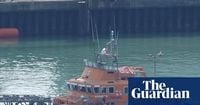On Friday, September 19, 2025, the English Channel saw a surge in crossings as 1,072 people arrived on British shores in 13 small boats, according to Home Office figures reported by several major outlets including BBC and The Guardian. This marks the third occasion in 2025 that daily arrivals have topped 1,000, a threshold that underscores the ongoing challenges facing the UK’s immigration system. The total number of Channel crossings so far this year has now reached 32,103, setting a new record for this stage in the calendar and surpassing figures seen in previous years.
The spike in arrivals came after more than a week of zero crossings, a lull attributed to poor weather and rough seas. As The Times noted, the sudden influx followed eight consecutive days with no recorded arrivals in Dover, Kent. When the weather finally relented, the numbers soared, with an average of over 80 people per boat making the perilous journey across one of the world’s busiest shipping lanes.
This dramatic day on the Channel coincided with the latest developments in the UK’s controversial “one in, one out” migration pact with France. Under this pilot agreement, which came into effect on August 5, 2025, the UK can detain and return individuals who arrive illegally in small boats, while accepting an equivalent number of asylum seekers from France through a new legal route. The arrangement, set to run until June 2026, aims to deter dangerous crossings and disrupt the business model of people-smuggling networks operating along the French coast.
Friday also saw the third deportation under the new deal. According to the Home Office and BBC, an Iranian man was returned to France, joining an Eritrean man who was also deported that day after losing a High Court challenge to halt his removal. The first removal under the agreement—a man from India—took place the previous day, Thursday, September 18. In total, three people have now been returned to France under the pilot, with government sources indicating that future returns will be ramped up in the coming months.
“These small boats crossings are utterly unacceptable and the vile people-smugglers behind them are wreaking havoc on our borders,” Home Secretary Shabana Mahmood declared in a statement reported by BBC. “Thanks to our deal with France, people crossing in small boats can be detained and the first removals have now begun. Protecting the UK border is my priority as Home Secretary and I will explore all options to restore order to our immigration system.”
Deputy Prime Minister David Lammy echoed this sentiment, describing the returns as an “immediate deterrent” to those considering the dangerous journey. Ministers hope that the visible enforcement of removals will discourage would-be asylum seekers from attempting to cross the Channel, especially if they perceive that they risk being quickly sent back to France. “The returns provide an immediate deterrent to people seeking to cross the Channel,” Lammy stated, as quoted by The Guardian.
However, not everyone is convinced that the new policy is having the intended effect. The scale of Friday’s crossings—coming so soon after the first removals—has fueled criticism from opposition politicians. Conservative shadow home secretary Chris Philp was particularly blunt, telling reporters the plan offers “no deterrent effect whatsoever” and describing the number of returns so far as “pathetic.” Philp added, “Boasting about it is absurd,” suggesting that the government’s claims of early success may be premature given the ongoing high volume of arrivals.
Government officials, for their part, point to the fact that these are forcible returns under a bilateral agreement with France, in contrast to the previous administration’s much-criticized Rwanda scheme. That plan, scrapped by the current Labour government, saw only four volunteers sent to Rwanda over two years—an outcome widely seen as ineffective. The current deal, officials argue, represents a more robust and practical approach, with the potential for numbers to increase substantially as operational capacity grows.
According to the Home Office, the enforcement of immigration rules has intensified across the board. In the past year, more than 35,000 people with no right to remain in the UK have been returned, a 13% increase over the previous year. This figure includes 5,200 foreign national offenders, representing a 14% rise in removals of individuals with criminal convictions. Additionally, enforcement actions against illegal working have surged by more than 50%, and the number of asylum hotels—a costly and controversial solution to housing new arrivals—has been slashed from over 400 in the summer of 2023 to fewer than 210 as of September 2025.
The reciprocal aspect of the UK-France deal is set to begin in earnest in the week starting September 22, 2025. The first flights carrying asylum seekers from France to the UK are expected to arrive, as reported by The Guardian and The Times. Home Office sources indicated that the numbers are expected to be “at or close to parity,” reflecting the “one in, one out” nature of the agreement. Each migrant returned to France is to be matched by a migrant with a strong asylum claim admitted to the UK through safe and legal channels.
Despite these efforts, the government acknowledges that the Channel crisis is far from solved. Ministers have openly stated that the pilot deal with France is not a silver bullet and will not, on its own, eliminate the cross-channel trade in human smuggling. The hope is that, over time, the demonstration of swift removals and the expansion of legal routes will shift the incentives for migrants and reduce the appeal of dangerous, illegal crossings.
Meanwhile, the political debate remains fierce. Critics argue that the numbers returned so far are negligible compared to the scale of the problem, and that more comprehensive solutions—both at the border and in the broader asylum system—are needed. Supporters of the current approach, however, contend that the pilot is still in its early days and that operational hurdles are being overcome as the process is refined.
For families and individuals making the crossing, the journey remains fraught with risk. Each boat that lands in Dover is a reminder of the desperation and determination driving people to seek a new life in the UK, as well as the complex policy challenges facing the government. With crossings at record highs and the new UK-France agreement under intense scrutiny, the coming months will test whether the “one in, one out” approach can deliver on its promise—or whether the crisis will continue to outpace political solutions.


